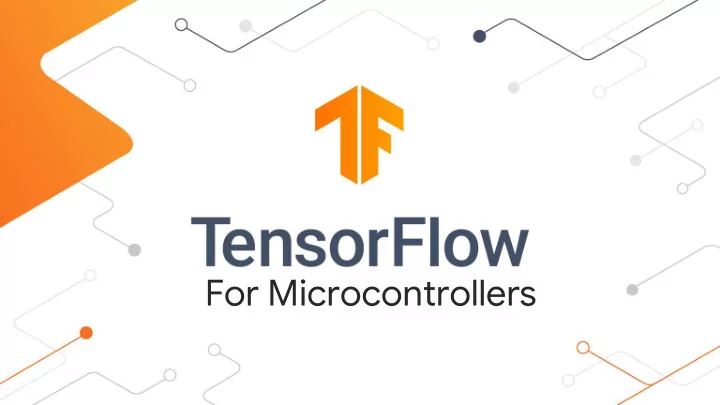

For Microcontrollers
Pete Warden Engineer, TensorFlow
What are we building?
Demo
Goals: Tiny Framework that fits in 5KB of RAM, 20KB of Flash - Speech demo with 30KB of RAM, 40KB of Flash -
Goals: Compatible Uses TensorFlow Lite APIs and file format - Most code shared with TF Lite - There’s a well -supported path to getting - TensorFlow models running
Goals: Extensible AKA hackable! - Works with Keil, Mbed, other IDEs - Only a small working set of files is needed - Simple to write specialized versions of ops - Full set of reference code and tests -
Goals: Extensible We’re experts on deploying ML, not MCUs - We need you! - We aim to make collaboration as simple as possible - We will deliver ML examples and benchmarks -
Example of Extensibility Depthwise Conv was too slow! Start by copying micro/kernels/depthwise_conv.cc to micro/kernels/portable_optimized/depthwise_conv.cc https://github.com/tensorflow/tensorflow/blob/master/tensorflow/lite/experimental/micro/kernels/portable_optimized/depthwise_conv.cc
int32 acc = 0; for (int filter_y = 0; filter_y < filter_height; ++filter_y) { for (int filter_x = 0; filter_x < filter_width; ++filter_x) { const int in_x = in_x_origin + dilation_width_factor * filter_x; const int in_y = in_y_origin + dilation_height_factor * filter_y; // If the location is outside the bounds of the input image, // use zero as a default value. if ((in_x >= 0) && (in_x < input_width) && (in_y >= 0) && (in_y < input_height)) { int32 input_val = input_data[Offset(input_shape, b, in_y, in_x, ic)]; int32 filter_val = filter_data[Offset( filter_shape, 0, filter_y, filter_x, oc)]; acc += (filter_val + filter_offset) * (input_val + input_offset); } } }
// Specialized implementation of the depthwise convolution operation designed to // work with the particular filter width of eight used by the default micro // speech sample code. It uses 1KB of RAM to hold reordered weight parameters, // converted from TFLite's NHWC format to NCHW format, and expressed as signed // eight bit integers, rather than unsigned. Care must be taken when calling // this not to use it for more than one node since there's only a single static // buffer holding the weights. You should use this implementation if depthwise // convolutions are a performance bottleneck, you have a layer that meets the // parameter requirements, and the extra RAM usage and additional code size are // not an issue. static inline void DepthwiseConvOptimizedForFilterWidthEight( TfLiteContext* context, const DepthwiseParams& params, const RuntimeShape& input_shape, const uint8* input_data, const RuntimeShape& filter_shape, const uint8* filter_data, const RuntimeShape& bias_shape, const int32* bias_data, const RuntimeShape& output_shape, uint8* output_data) { ...
// If this is the first time through, repack the weights into a cached buffer // so that they can be accessed sequentially. static bool is_reshaped_filter_initialized = false; if (!is_reshaped_filter_initialized) { for (int filter_y = 0; filter_y < filter_height; ++filter_y) { for (int filter_x = 0; filter_x < filter_width; ++filter_x) { for (int oc = 0; oc < output_depth; ++oc) { const uint8* current_filter = filter_data + Offset(filter_shape, 0, filter_y, filter_x, oc); int8* reshaped_filter = reshaped_filter_data + Offset(reshaped_filter_shape, 0, oc, filter_y, filter_x); *reshaped_filter = (int32_t)(*current_filter) + filter_offset; } } } is_reshaped_filter_initialized = true; } ...
if ((filter_width == 8) && !is_out_of_x_bounds) { int8* current_filter = reshaped_filter_data + Offset(reshaped_filter_shape, 0, oc, filter_y, filter_x_start); const uint32_t input_vals0 = *reinterpret_cast<const uint32_t*>(current_input); current_input += 4; const int32_t filter_vals0 = *reinterpret_cast<const int32_t*>(current_filter); current_filter += 4; const uint8 input_val0 = input_vals0 & 0xff; const int8 filter_val0 = filter_vals0 & 0xff; acc += filter_val0 * input_val0; const uint8 input_val1 = (input_vals0 >> 8) & 0xff; const int8 filter_val1 = (filter_vals0 >> 8) & 0xff; acc += filter_val1 * input_val1; const uint8 input_val2 = (input_vals0 >> 16) & 0xff; const int8 filter_val2 = (filter_vals0 >> 16) & 0xff; acc += filter_val2 * input_val2; const uint8 input_val3 = (input_vals0 >> 24) & 0xff; const int8 filter_val3 = (filter_vals0 >> 24) & 0xff; acc += filter_val3 * input_val3;
} else { const uint8* current_filter = filter_data + Offset(filter_shape, 0, filter_y, filter_x_start, oc); for (int filter_x = filter_x_start; filter_x < filter_x_end; ++filter_x) { int32 input_val = *current_input; current_input += input_depth; int32 filter_val = *current_filter; current_filter += output_depth; acc += (filter_val + filter_offset) * (input_val + input_offset); } }
Future? Depthwise Conv was too slow! Start by copying micro/kernels/depthwise_conv.cc to micro/kernels/portable_optimized/depthwise_conv.cc https://github.com/tensorflow/tensorflow/blob/master/tensorflow/lite/experimental/micro/kernels/portable_optimized/depthwise_conv.cc
Future - Visual Wake Words Aakanksha Chowdhery ML Engineer
Future - Visual Wake Words Popular use-case: classify person/not-person Initially presence classification Eventually extend to object counting/localization
Future - Visual Wake Words Popular use-case: classify person/not-person ImageNet dataset: classifies 1000 classes CIFAR10: very low-resolution images Need ImageNet for microcontrollers !
Future - Visual Wake Words Open data set based on MS COCO Labeled images with >5% person
Future - Visual Wake Words Need models that fit 250 KB SRAM Compressed MobileNet architectures to <250KB Initially presence classification >90% accuracy
Future - Visual Wake Words Dataset release and challenge details coming up soon! More details at the poster session!
Get it. Try it. Code : github.com/tensorflow/tensorflow/tree/master/tensorflow/lite/experimental/micro Docs : tensorflow.org/lite/guide/microcontroller Example : g.co/codelabs/sparkfunTF
Recommend
More recommend